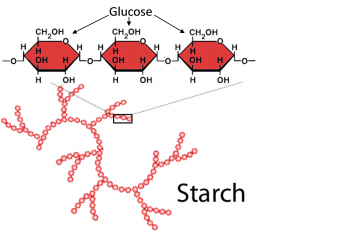Serendip is an independent site partnering with faculty at multiple colleges and universities around the world. Happy exploring!
A Scientific Investigation – What types of food contain starch and protein?

In the first part of this activity, students use basic information about the structure, functions, and synthesis of starch and proteins to understand why certain parts of plants or animals contain starch and/or proteins.
Then, students practice the scientific method by carrying out key components of a scientific investigation, including generating hypotheses, developing experimental methods, designing and carrying out experiments to test their hypotheses, and, if needed, using experimental results to revise their hypotheses. (NGSS)
Download Student Handout: PDF format or Word format
Download Teacher Preparation Notes: PDF format or Word format
We invite comments on this NGSS-aligned hands-on activity, including suggestions for other teachers who are planning to use the activity and any questions you have. If you would prefer to send your comments or questions in a private message, please write Ingrid Waldron at iwaldron@upenn.edu











Comments
2024 revision
The questions and explanations in the Student Handout have been clarified. The Teacher Preparation Notes have also been clarified.
Ingrid
2021 revision
The Student Handout has been revised to improve clarity and has been enhanced with additional explanatory figures. Also, I have added explanations and questions to help students understand how starch and/or protein in seeds, milk, or muscle were useful for the plant or animal from which the food was derived.
Ingrid Waldron
handout
Hello This worksheet is not downloadable 2021 revision.
Student Handout
I am confused by your comment, since I just tried and did not have any trouble downloading either the Word version or the PDF of the Student Handout. Please try again and then let us know more specifically what problem you are experiencing.
Ingrid
answer key?
I was wondering if there was an answer key anywhere? In particular, we wanted to know the precise answer for the characteristics of the organic compounds. Thank you!
Answer key
Please see the Teacher Preparation Notes for instructional suggestions, biology background, and information about how to request a key.
Ingrid
Thank you!
I just wanted you to know that I really appreciate your resources; I am going to attempt using your Starch/Protein experiment as part of a unit on the nature of science for our GED Distance Learning Program in South Dakota. Most GED teachers teach every part of the high school curriculum, so having high quality resources would be impossible without the help of folks like you. Thanks!
Education; Biology
Very Good Work, Deep And Incisive
September 2016 Revision
The Student Handout has been revised for greater clarity, including improved experimental procedures to increase the reliability of the results. In the Teacher Preparation Notes, we have improved the instructional suggestions and the description of needed supplies.
2016 revision
This revised activity is aligned with the Next Generation Science Standards (NGSS). The Student Handout includes a new section that introduces students to the structure and functions of starch and proteins and the use of glucose for the synthesis of other organic molecules. In the second and third sections, students learn about scientific investigation by carrying out key components of the scientific method.
2013 revision
This activity has been renamed "A Scientific Investigation – What types of food contain starch and protein?" to clarify the purpose of this activity, which is designed to enhance student understanding of the scientific method. Students carry out key components of a scientific investigation, including developing experimental methods, generating hypotheses, designing and carrying out experiments to test these hypotheses and, if appropriate, using experimental results to revise the hypotheses. The questions and logic have been clarified in the revised Student Handout. Additional suggestions for class discussion and links to other resources for teaching about the scientific method have been included in the revised Teacher Preparation Notes.
Post new comment